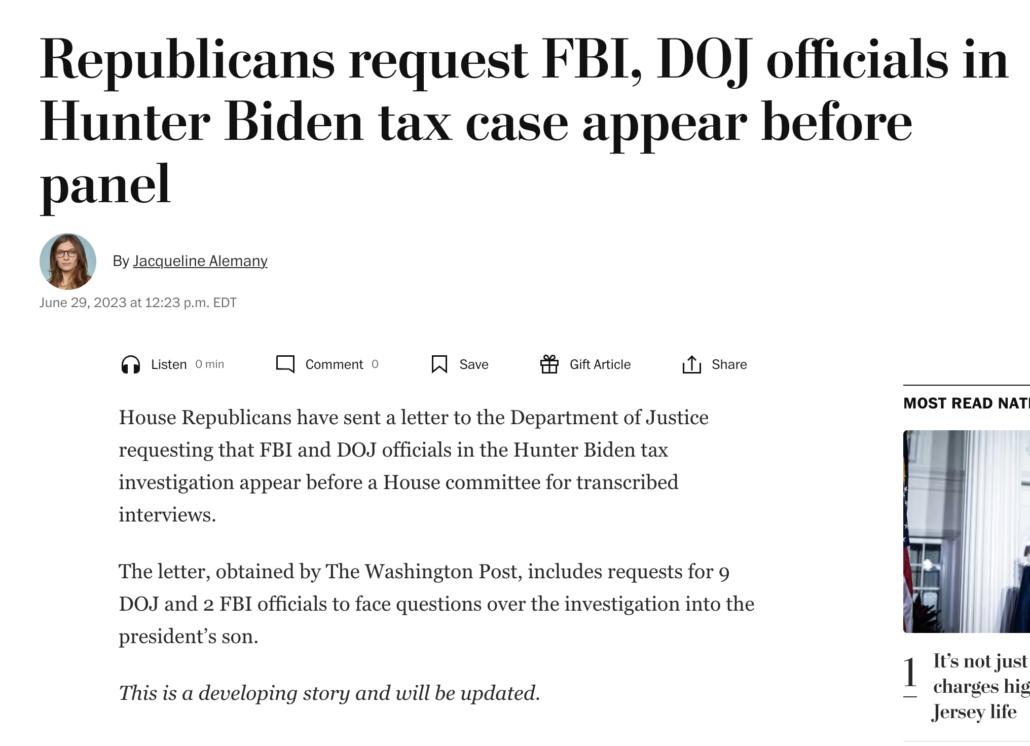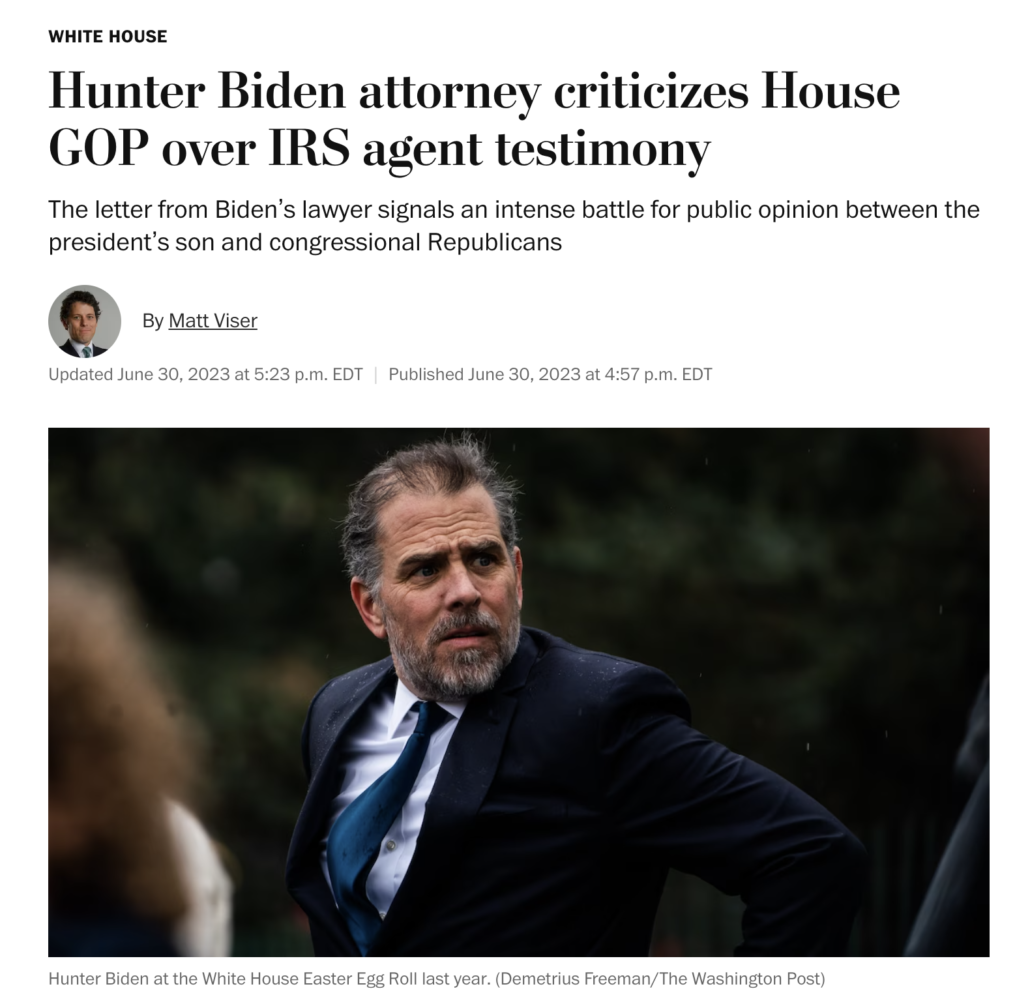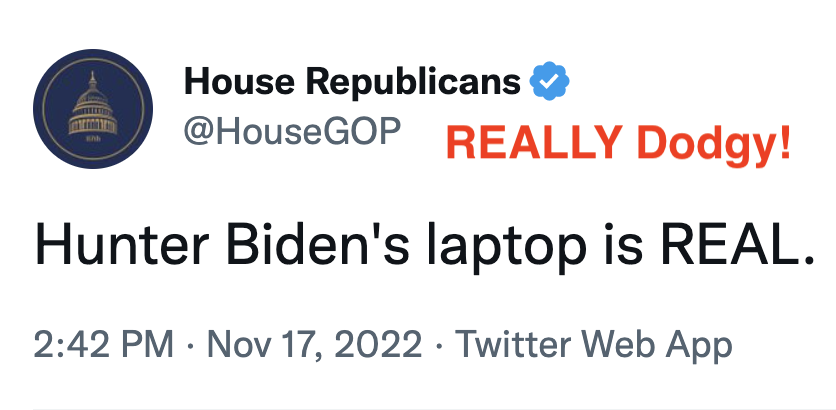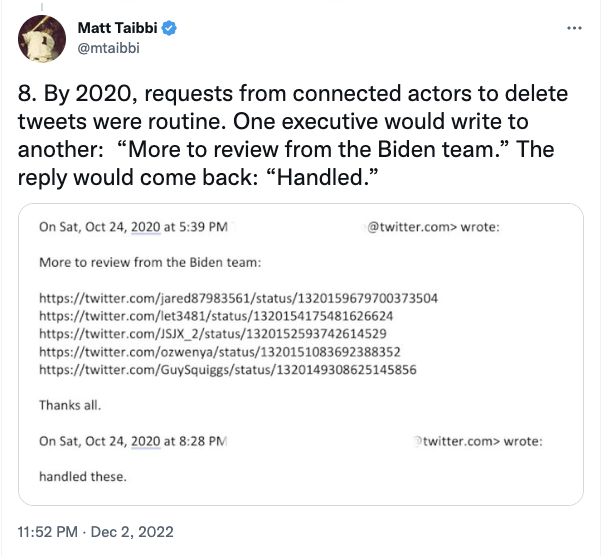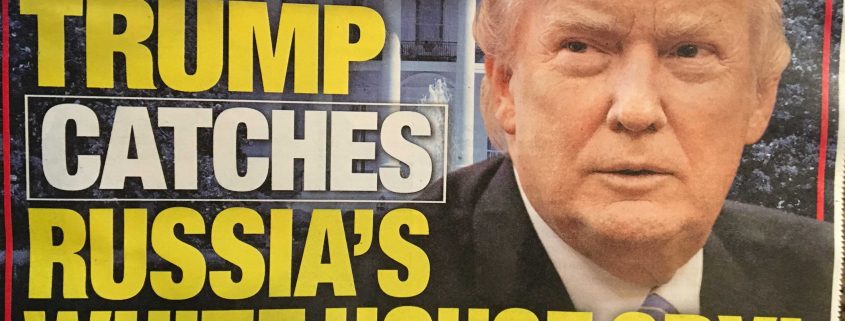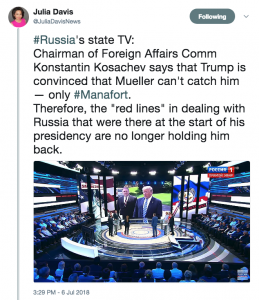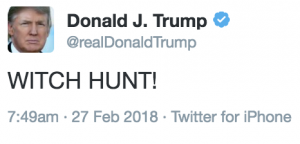Republican House Chairmen Are Resorting to Immunizing Crimes to Gin Up Their Fake Scandals
Even before Abbe Lowell wrote a long letter trying to make this plain for obtuse journalists, it was clear to me that Republican House Chairmen are resorting to immunizing crimes in an attempt to gin up scandals to use against Joe Biden.
It’s right there at the start of Gary Shapley’s testimony.
IRS agents are prohibited from leaking details from private tax returns.
To permit Shapley to do so, the (unnamed) House Ways and Means Majority Counsel first laid out that Shapley was sharing information as a whistleblower, effectively waving a magic wand to let Shapley ignore this prohibition.
MAJORITY COUNSEL 1. Finally, I’d like to note the information discussed here today is confidential. As an IRS agent, I know you understand the significance of our tax privacy laws. Chairman Smith takes our tax privacy laws extremely seriously, and we have worked diligently to make sure that you can provide your disclosures to Congress in a legal manner and with the assistance of counsel.
As I’m sure you know, 26 U.S.C. Section 6103 makes tax returns and return information confidential, subject to specific authorizations or exceptions in the statute.
The statute anticipates and provides for whistleblowers like yourself to come forward and share information with Congress under Section 6103(f)(5).
Specifically, that statute permits a person with access to returns or return information to disclose it to a committee referred to in subsection (f)(1) or any individual authorized to receive or inspect information under paragraph (4)(A) if the whistleblower believes such return or return information may relate to possible misconduct, maladministration, or taxpayer abuse In your position at the IRS, do you or did you have access to return or return information covered by Section 6103 of the Internal Revenue Code?
Mr. Shapley. Yes.
MAJORITY COUNSEL 1. Have you had access to return information that you believe may relate to possible misconduct, maladministration, or taxpayer abuse?
Mr. Shapley. Yes.
MAJORITY COUNSEL 1. Do you wish to disclose such information to the committee today?
Mr. Shapley. Yes, I do.
And, as Lowell noted, Shapley then answered a bunch of questions, some of which were unrelated to his core allegations. Then, days after the Hunter Biden settlement was out, House Ways and Means Chair Jason Smith released Shapley’s transcript, after which Shapley has run to the right wing media to repeat his allegations.
Shapley’s media appearances might constitute a crime. But how is Merrick Garland’s DOJ going to prosecute it, now that the right wing has made Shapley a hero for floating the latest manufactured scandal about Hunter Biden? Hell, Shapley is going to be the cornerstone of an attempt to impeach Garland, not for prosecuting Shapley for breaking the law, but because Garland let a Trump appointee prosecute the President’s son unimpeded.
That’s Garland’s sin: Letting a US Attorney appointed by Donald Trump prosecute the son of the most powerful man in the world, something that should be a remarkable, however sober, feat of due process, but which Republicans want to undermine because a Republican US Attorney didn’t find enough crime for their needs, because they need this story to go on and on and on.
In his letter, which was addressed to Chairman Smith, Lowell also pointed out what was clear to both me and Andrew Prokop: One or both of these IRS so-called whistleblowers may be source(s) for the biennial right wing leak to Devlin Barrett, leaks that always appear just before and are intended to influence an election, leaks that in this case got the IRS team removed from the investigation.
Right wingers seem to like Devlin because he can be trusted to write down what they tell him to write, rather than write what the evidence they describe would indicate. In 2020, for example, Devlin read an interview report, which was improperly redacted, and which made it clear that a right winger on the Mike Flynn case bullied a woman at work and was willing to make claims about which he had no first hand knowledge, and instead of reporting that, Devlin claimed that it indicated misconduct in the Mueller investigation. Last fall, Devlin took evidence that some investigators who were either ignorant of or ignoring known details about the documents seized at Mar-a-Lago and instead tried to preempt investigative conclusions by proclaiming that Trump didn’t exploit the documents he stole for personal gain. In 2016, Devlin wrote the story that would eventually get Andy McCabe fired — yet another scandal that fed itself for years — because he deigned to correct the false claims of people trying to impugn Hillary before the election.
In the case of investigators on the Hunter Biden team, the pre-election leak at issue here, Devlin took a report making clear that investigators had not substantiated any of the foreign influence peddling claims about Hunter Biden and instead let agents use him to pressure David Weiss to charge Hunter in a certain way and do so before the election.
Regurgitating right wing law enforcement claims of scandal credulously is what Devlin seems to do best. “If it’s what you say, I love it, especially later in the campaign season,” seems to be Devlin’s journalistic ethos.
And it’s not just tax law that Devlin’s sources violated by leaking details about the Hunter Biden investigation. As Lowell notes, it may well be grand jury information — something Lowell alleges was also included in Shapley’s disclosures (though about this I’m less convinced).
As I said, if one or both of these men do turn out to be Devlin’s source, then the scandal created here will make it far harder to prosecute them, just as Jim Jordan has been trying to reward several other people — FBI agents — suspected of leaks politicizing the FBI by retroactively claiming they’re whistleblowers after a disciplinary process began.
Then, Republicans are using the confidentiality guaranteed as part of due process to create more scandal. In the wake of the transcript release, Republicans released a letter demanding more testimony from people who would not normally, and won’t now, be able to comply, especially given that this is an active prosecution. The WaPo, which played a central role in this false scandal in the first place, reported that as “news,” without explaining to readers that of course the recipients won’t comply and won’t be able to and shouldn’t be able to, in the same way people investigating Donald Trump should not be and are not running to Congress to describe what they discovered in Melania’s underwear drawer.
This is a stunt. It should be reported as a stunt. Until it is reported as a stunt, Republicans will continue to corrode democracy, using their majority to do nothing but manufacture political dirt.
WaPo offered no context in their report on this manufactured story (including noting that Trump was accorded the same treatment as some of the things being spun as distinct). It’s just pure pavlovian reaction, taking dogshit from Republicans who have made it crystal clear for six months they plan to do nothing — nothing!! — else with their majority than simply manufacture scandals, and packaging up obvious dogshit as if it were news. Notably, there’s also no update (why update a story manufactured for a pre-holiday Friday release?) to note that US Attorney David Weiss (originally identified as an AUSA, which betrays ignorance about a key detail of the way DOJ guards independence and took special measures to do so here) did respond to the letter, predictably saying that he can’t violate the confidentiality that Shapley did, but also reiterating his past claims that he was in charge of the decisions on this case.
Why ruin the clickbait scandal with actual facts?
Then, finally, this manufactured scandal moves onto the next step, in which WaPo claims to be helpless to assess these contested claims — in which several US Attorneys have repeatedly debunked claims about topics that Shapley was not in a position to know — so instead suggests that Lowell’s letter will instead just create a difference of opinion.
Here’s how the WaPo — again, which is one key reason there is a scandal here in the first place — described the manufactured scandal that Republicans have not hid was a manufactured scandal, at all.
Lowell’s letter battling with Congress illustrated that while the president’s son appears close to resolving the federal misdemeanor charges — and this week also settled a separate child support case — he still faces a number of challenges that could yield further headlines. The action is set to move from the courthouse to Capitol Hill, as Republicans delve into Biden’s business dealings and scrutinize the Justice Department’s handling of the criminal investigation.
[snip]
Lowell’s salvo signaled the beginning of what could be a newly intense phase of the battle for public opinion between the president’s son and congressional Republicans.
It’s all about the headlines to the WaPo that wittingly made it headlines in the first place.
Lowell’s letter is not “battling with Congress.” Lowell’s letter is not “battl[ing] for public opinion.
He’s laying out some basic facts, not only answering some questions that have floated for months about Hunter Biden’s conduct, but also pointing out the crime that WaPo of course is not going to report on, because of course they cannot.
Rather than assess the facts, WaPo instead resorts to both-sides glee — this scandal, the one they kicked off, will continue forever!!!
I don’t know what kind of person goes into journalism only to profess utter helplessness to weigh the credibility of various sources, or even whether someone was in a place to know what he is claiming he knows. I don’t know why someone would go into journalism only to willingly treat people like James Comer and Jim Jordan as credible, when even Steve Doocy keeps mocking them for their flimsy claims, when they don’t even try to hide what they’re up to! I don’t know what kind of credulity you would need to immediately treat a request for testimony designed to be impossible as big breaking news.
I do know this: in 2014, some corrupt oligarchs decided to put Joe Biden’s son in a place where, no matter what he did, they could use it to their future advantage. It was stupid for him to take that offer, but let’s all acknowledge it was a set-up from the start. I know that no later than 2018, other corrupt oligarchs, some with clear ties to Russian spooks, started pitching Hunter Biden as a scandal, all wrapped up for Donald Trump’s personal consumption. I know that ever since, Republicans have been milking the addiction recovery of a private citizen relentlessly. I’m not sure a private figure has ever been scrutinized so closely and relentlessly by Congress, including past mob or union corruption investigations that actually served the public interest. I know that Trump’s own tax scandals, Ivanka and Jared’s influence peddling, Trump’s corrupt oligarch ties, Trump’s pardons — including of far bigger tax cheats than Hunter Biden — have gotten nowhere near this level of scrutiny, and almost no one is making the GOP’s base hypocrisy here the story.
I know that Hunter Biden has made a ton of mistakes in his life, and I admire that he is doing the hard work to turn his life around. I can’t imagine trying to do it at a time when millions of people have made him their personal plaything for scandal.
What I don’t understand is how self-respecting people can so willingly play a part of the effort to rip Hunter Biden to shreds solely because Republicans choose to run on wildly hypocritical scandal-mongering rather than policy. You’re letting half-wit bozos manipulate you like children, and you’re positively gleeful about it! Do you not understand — or care — what a grotesque project you’re playing useful idiots for?
Back in 2020, Zeynep Tukfeci wrote what remains one of the most insightful pieces on the way that Republicans have milked Hunter Biden’s legal challenges and addiction for their political ends.
[T]raditional media is, still, terrible at recognizing how these hack-and-leaks are, in fact, as much about blackmailing political candidates as they are about politically relevant allegations.
That’s right, there’s a blatant blackmail attempt right in front of our eyes, and we’re not recognizing it for what it is.
[snip]
Is the Hunter story newsworthy, in the sense that it should be reported on? Yes, of course. Should Joe Biden be asked about some of the allegations? Yes, of course. (Note the some).
But the real questions we need to ask of ourselves are these: what should be asked of Biden? How much media attention should be given, to what parts of the story? What parts of the story are very important,, and not being covered?
This has been an ongoing theme in my work: In the 21st century, it is attention, not speech, that is restricted and of limited quantity that the gatekeepers can control and allocate. In the digital age, especially in countries like ours, there is no effective way of stopping people from publishing or talking about this story through traditional censorship—but there are many ways to regulate how much attention it gets.
[snip]
In 2016, the media got hacked—not in the sense of a computer breach, but that their unreflective habits allowed them to be played. They spent their time giving disproportionate attention to gossip and privacy violations that were illegitimate—ironic, in my view, since they barely covered the newsworthy aspects of that hack.
Before the 2016, election, in a New York Times op-ed, I called this whistle-drowning. Whistle-blowing is designed to focus our attention on something that is being kept from the public, something that is in the public’s interest to know and evaluate. Whistle-drowning is designed to flood the public a flurry of allegations that make it very difficult to concentrate on the important questions facing us.
[snip]
If a story about Hunter Biden deserves attention and not getting it yet, it is this: the Hunter Biden story, as it has happened, is a blatant attempt to blackmail and rattle his father, who is, of course, concerned over his son’s struggles with drug addiction. In that context, and with appropriate diligence, allegations of influence-peddling should be investigated, with proper reporting, not innuendo.
[snip]
The media is still under some illusion that fairness and balance means devoting equal attention to allegations about, and stories potentially damaging to, both candidates–rather than devoting proportional attention to allegations and stories according to their credibility, scale, scope and importance.
She calls this a hack-and-leak (this was before it became clear that the “laptop” was instead an alleged theft and leak), but a better description is just trolling. Indeed, what Comer and Jordan — and now Smith — are using their gavels for is no different than what Microchip, one of the trolls who played an instrumental role in getting people to care about John Podesta’s risotto recipe rather than Donald Trump’s racism and emotional instability in the 2016 election, testified he succeeded in doing in 2016.
Q What was it about Podesta’s emails that you were sharing?
A That’s a good question.
So Podesta ‘s emails didn’t, in my opinion, have anything in particularly weird or strange about them, but my talent is to make things weird and strange so that there is a controversy. So I would take those emails and spin off other stories about the emails for the sole purpose of disparaging Hillary Clinton.
T[y]ing John Podesta to those emails, coming up with stories that had nothing to do with the emails but, you know, maybe had something to do with conspiracies of the day, and then his reputation would bleed over to Hillary Clinton, and then, because he was working for a campaign, Hillary Clinton would be disparaged.
Q So you’re essentially creating the appearance of some controversy or conspiracy associated with his emails and sharing that far and wide.
A That’s right.
Q Did you believe that what you were tweeting was true?
A No, and I didn’t care.
Q Did you fact- check any of it?
A No.
Q And so what was the ultimate purpose of that? What was your goal?
A To cause as much chaos as possible so that that would bleed over to Hillary Clinton and diminish her chance of winning.
It’s about chaos, not facts. Manufactured conspiracy can and is designed to distract from the fact that there’s no there there. It is designed to make voters irrational. It is designed to make democracy fail.
Over time, Shapley’s claims, as well as any misconduct allegations about Devlin’s sources, will be reviewed — but anyone with the most basic understanding of how due process works in the country knows that that’s not going to happen immediately, also knows that Jim Jordan and James Comer are the last people you’d ask to conduct a competent review of anything.
And so the willingness to bow to Comer and Jordan and Smith’s demands that it be immediate and relentless is just willingness to be used, manipulated, to perpetuate the kind of manufactured conspiracy that is designed to kill democracy.



